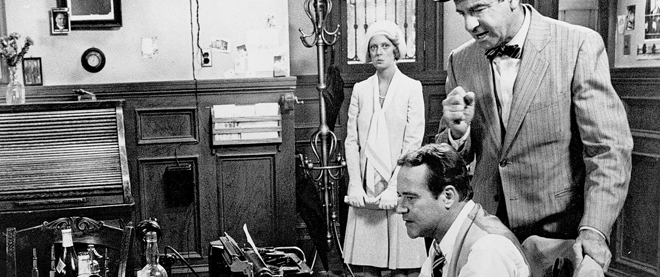The same old story?
The News of the World scandal is a lot like the comedy The Front Page, only without any redeeming qualities
Share

The News of the World turns out to be a lot like The Front Page, but somehow that fills us with disgust, not nostalgia. The often-performed, frequently filmed newspaper comedy has defined much of what we know about the good old days of journalism, and it seems a lot like today’s bad days. The lead character of the play, reporter Hildy Johnson, describes his job as, “Peeking through keyholes! Running after fire engines like a lot of coach dogs! Waking people up in the middle of the night to ask them what they think of companionate marriage. Stealing pictures off old ladies of their daughters that get raped in Oak Park.” It turns out that today he’d simply be hacking into a computer to get the pictures, but otherwise, not much seems to have changed.
Hildy’s editor, Walter Burns, will do anything to get an exclusive story and the advertiser dollars that come with it: he hires a small-time gangster to do dirty work for him (including kidnapping an old woman), lies to everyone, plants evidence, and violates all kinds of ethics and laws in his 1½ acts of stage time. The result was a beloved comic rogue who was portrayed by Cary Grant in the movie His Girl Friday. It’s a little different with similar alleged behaviour on tabloids today: instead of getting played by Cary Grant, you get busted by Hugh Grant.
Old-school portrayals of unethical journalism are easier to love because, for one thing, they’re fictional. But they’re also about a time when we could believe that reporters, however awful, served a noble purpose. The story of The Front Page is that by pursuing a sensationalistic story, the journalists manage to expose the corruption of the city government. Most of them don’t seem to care about anything more than their headlines, and they’re happy to ruin people’s lives (including driving a woman to attempt suicide) to get them. Many of their tactics, like bribing the police to get information, would seem at home in a story about News International. But in the end, the play promises us, muckraking reporters will make politics more honest.
That was easy to believe back when sleazy journalists really did hate sleazy politicians. Front Page writer Ben Hecht told an interviewer that when he worked at a newspaper, he and his colleagues sometimes made stories up, but added that he had contempt for politicians: “They bore me. The best of them are dummies and the worst are pickpockets.” Reporters who didn’t try to be respectable were less suspect than the respectable, well-educated ones, who might pal around with powerful people. Even a movie about a classy paper like All the President’s Men reinforced this idea by portraying its heroes Bob Woodward and Carl Bernstein as little fish, not insider journalists like, well, the Bob Woodward of today.
But now, the lowbrow journalists seem as likely as any others to be in bed with the politicians. When the public found out that Andy Coulson had gone from the News of the World editorship to David Cameron’s government, it seemed almost like a natural progression. What Slate’s Jack Shafer described as “the revolving door between Rupert Murdoch’s house of crime and 10 Downing Street” was just part of a cozy relationship between tabloids and government, after years of prime ministers and presidents seeking the favour of Murdoch. We could at least think that Walter Burns was more interested in ruining big people’s lives than little people’s; today we’d just think he was angling for a political job.
Ironically, this whole affair may actually improve the image of journalism as a profession. After all, as Shafer points out, the Guardian’s Nick Davies did “a hero turn” by exposing the scandal, a classic story of the press doing a job that the government and the police wouldn’t. But Davies is the antithesis of the lowdown, unscrupulous reporters celebrated in The Front Page; he’s an Oxford-educated journalistic veteran who, before he started writing this story, argued that his profession is too focused on the bottom line: “The relentless impact of commercialisation,” he wrote, “has seen our journalism reduced to mere churnalism.” If The Front Page told us commercialism will work out for the best—a paper intent on making a quick buck can also help society—then this scandal suggests that in the here and now, we need high-minded, stuffy, elite journalists to save us from the real Walter Burnses and Hildy Johnsons of the world.